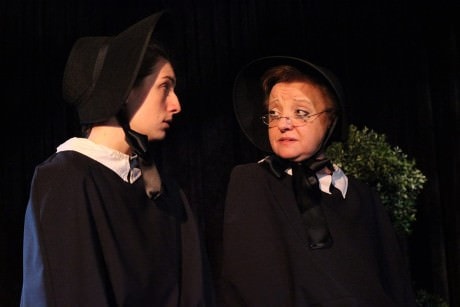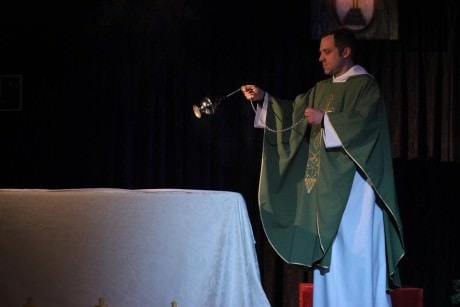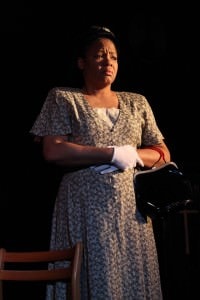There is a dilemma in this play, as in life, regarding who should be believed and who should be trusted. Are a character’s suspicions groundless or based on evidence? If someone with wisdom from years of experience states, “I just know…” do you put trust in them? Great plays ask important questions. They don’t always provide answers.

In 2005, Doubt: A Parable won the Pulitzer Prize for Drama and the Tony Award for Best Play. Author’s notes by playwright John Patrick Shanley are in the playbill, where one might normally see the director’s notes. Stanley writes, “It is Doubt (so often experienced initially as weakness) that changes things.” Ten years after its Broadway debut, this production still resonates and opens an audience to reflect upon our own convictions.
The program labels the performance space for Doubt: A Parable as City of Fairfax Theatre Company’s Pop-Up Theatre, and is performed in an open art space in downtown Fairfax. It is intended for adults and is a departure from the typical productions of this company, which generally produces either plays for children or family-friendly plays.
The audience experience felt a like a start-up to me. The theater space is in an empty store front on the street level of University Drive. Within the larger space was the theater, walled by floor-to-ceiling curtains, providing a small, intimate playing space. The staging is on platforms at one end of the theater, setting the audience as if we were in a small church, with the three foot height of the stage removing a little bit of the feeling of intimacy.
Doubt: A Parable is a powerful play about a Catholic school’s staff, concerned with the children in the school. The staging reflected 3 simultaneous settings for the play; the principal’s office, the garden next to the rectory, and the podium in the chapel. This allowed for minimal scene changes, a time saver which kept the momentum of the piece flowing. By using a cover over the desk, it was the chapel’s altar for the play’s opening, and I wondered if the altar/desk might have been preset where it was needed for the rest of the play, rather than down center, simplifying the one scene change.
With only four parts, the show relies on solid performances of the actors. Director Ed Zakreski has found and directed a talented team, fully capable of playing the raw, honest emotions required for this drama.
The conflict of the play centers around the parish priest, Father Flynn (Chris Anderson) and Sister Aloysius (Lisa Anne Bailey), principal of the Catholic grade school who distrusts him, though he is her superior in the church hierarchy. They represent opposing attitudes towards the roles of the church and its clergy.

Father Flynn is compassionate and nurturing, while Aloysius is severe, rule-bound, and full of conviction. Ironically, they both seem to prioritize the needs of the children of their parish but distrust each other. Anderson plays Flynn as a gracious leader accused of something horrid to him. It is easy to trust him until Bailey shows us that Aloysius, despite being very negative, is often right believing in her instincts.
Bailey’s portrayal of Aloysius is the center of the play and she is masterful. At once cynical and petty, she also reveals surprising insights and the power of her convictions is intense. The audience questions and may come to share her doubts about Flynn.
Sister James (Anna Fagan) is entirely believable as the naive young nun early in her teaching career. We see her joy in teaching and her anguish when she is told she is doing it wrong by Aloysius, and later when she is put in a compromising position. We see what it takes to stand up to bullying and her struggle to do the right thing.

Mrs. Muller (Brenda Parker) appears in just one scene, but her sincerity and concern for her son find her making surprising, yet believable decisions about choices of action. Parker clearly acted both the distrust of, and deference to the Catholic school principal, but I wish she had faced off physically with Aloysius more often. When she turned out to the audience for most of her lines, it didn’t seem to reflect the strong woman making reasoned, very difficult decisions about her boy.
A moment I found especially compelling was when Sister James finds Sister Aloysius gardening, and what the audience sees, is the principal has covered the plants to protect them. I found the garden to be an apt analogy for caring for the children and it was the garden scenes where I saw Aloysius as devoted to the children’s well-being more than abusive. Following the analogy, as she covered the plants, she put the children’s “light under a bushel.” This view of how to fulfill her primary duty to the children differs from Sister James’ or Father Flynn’s who try to find the light in the children.
The play takes place in 1964, which provided me the one anachronistic issue I had with the performance. The character’s attitude seemed as if they were based on current politically correct sensibilities. Father Flynn and Sister James seemed hyper-aware of the potentially bad appearance of them being seen alone together in the garden or of him touching her shoulder in sympathy. Such concerns and the rapid assumption of priests’ sexual harassment or impropriety seemed more likely today than in 1964 when the Catholic Church was more patriarchal and less vocal about such issues.
Design was useful in bringing the audience into the world of the show. Lighting by Scott Graham, was generally good, focusing the attention of the audience where the director needed it to be. It did have one of the few technical glitches I noticed in the play. One instrument behind the stained glass window flickered on-off a few times. I have seen lights “ghost” like that before and I think it was not intended, but I found it distracting.
Organ music played hymns during scene changes and worked well to evoke the space and mood. The audience was reminded of both the beauty and the power that is associated by many with worship. Costumes were excellently designed by Lori Crockett and Sierra Hoffman. They reflected the period, the clergy, and the one parishioner very appropriately.
City of Fairfax Theatre Company’s Doubt: A Parable is a thought-provoking, well-acted production well worth seeing. All four actors are compelling and the story is relevant. I applaud the company for bringing such a powerful show to Fairfax. Do not miss these superb performances.
Running Time: 90 minutes, with no intermission.
Doubt plays through March 15, 2015 at City of Fairfax Theatre Company performing at the Pop-Up Theatre in Old Town Village – 3950 University Drive, in Fairfax, VA. Purchase tickets at the door, or online.
______
[Note: I have been in the space before for an art gallery opening, and am excited that Fairfax City is offering the space as an arts incubator, which is fantastic for the community. The space is a little chilly, so dress warmly. Also incense is used in the opening of the play and although it’s quite effective in setting up the scene, it is quite overpowering and it lingers on after the scene is over. Also, because the space lacks its own bathrooms, the restaurant next door is generously allowing theater patrons to use their restrooms, so thanks to them for their generosity].
Photos are courtesy of City of Fairfax Theatre Company.






Actually, the script is quite clear about priests and nuns not being alone together:
“We are rightly discouraged from crossing paths with priests unattended.”
“I can’t be closeted alone with a priest.”
“Aside from the unacceptability of a priest and nun being alone together…”
“We would require a third party.”
“A third party is truly required, Father.”